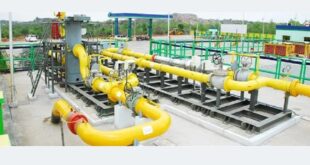Recently, the Indian Farmers Fertiliser Cooperative Limited (IFFCO) introduced the world’s first Nano Urea Liquid for farmers across the world.
Indian Farmers Fertiliser Cooperative Limited
- It is one of India’s biggest cooperative societies which is wholly owned by Indian Cooperatives
- Founded in 1967 with just 57 cooperatives, today it is an amalgamation of over 36,000 Indian Cooperatives with diversified business interests ranging from General Insurance to Rural Telecom apart from its core business of manufacturing and selling fertilisers.
- To enable Indian farmers to prosper through timely supply of reliable, high quality agricultural inputs and services in an environmentally sustainable manner and to undertake other activities to improve their welfare.
Important points:
- It is a nutrient (liquid) to provide nitrogen to plants as an alternative to the conventional urea.
- It is developed to replace conventional urea and it can curtail the requirement of the same by at least 50%.
- It contains 40,000 mg/L of nitrogen in a 500 ml bottle which is equivalent to the impact of nitrogen nutrient provided by one bag of conventional urea.
- Conventional urea is effective 30-40% in delivering nitrogen to plants, while the effectiveness of the Nano Urea Liquid is over 80%.
- Its effectiveness has been tested in over 11,000 farmers’ fields for 94 crops like rice and wheat.
- An average 8% increase in yield has been witnessed.
- It has been indigenously developed at Nano Biotechnology Research Centre, Kalol, Gujrat in line with Atmanirbhar Bharat and Atmanirbhar Krishi.
- India is dependent on imports to meet its urea requirements.
Significance:
- It has been found effective and efficient for plant nutrition which increases the production with improved nutritional quality.
- It will boost a balanced nutrition program by reducing the excess use of Urea application in the soil and will make the crops stronger, healthier and protect them from lodging effect.
- Lodging is the bending over of the stems near ground level of grain crops, which makes them very difficult to harvest, and can dramatically reduce yield.
- It will also have a huge positive impact on the quality of underground water, a very significant reduction in global warming with an impact on climate change and sustainable development.
- It is easy on the pocket of farmers and will be effective in increasing farmers’ income. It will also significantly bring down the cost of logistics and warehousing.
SOURCE: THE HINDU,THE ECONOMIC TIMES,MINT
 Chinmaya IAS Academy – Current Affairs Chinmaya IAS Academy – Current Affairs
Chinmaya IAS Academy – Current Affairs Chinmaya IAS Academy – Current Affairs



